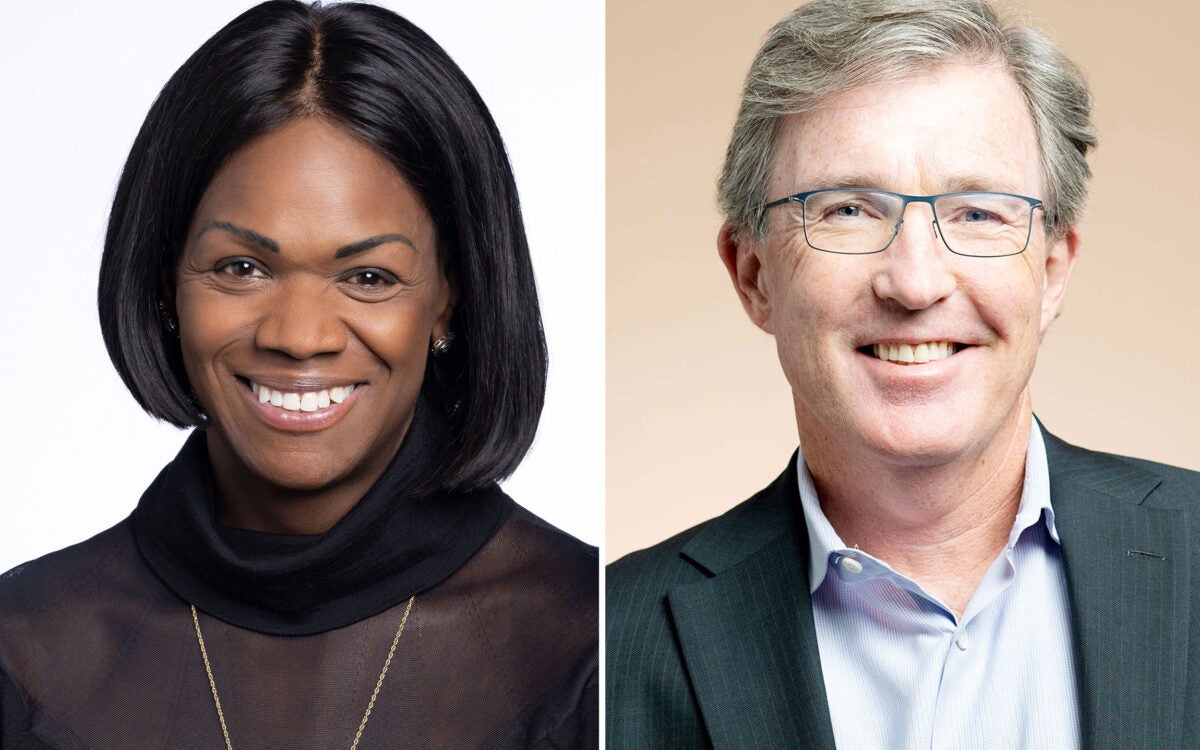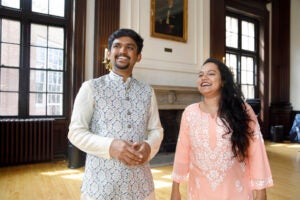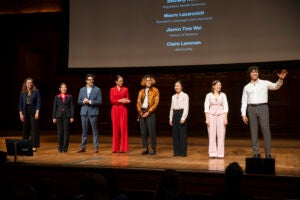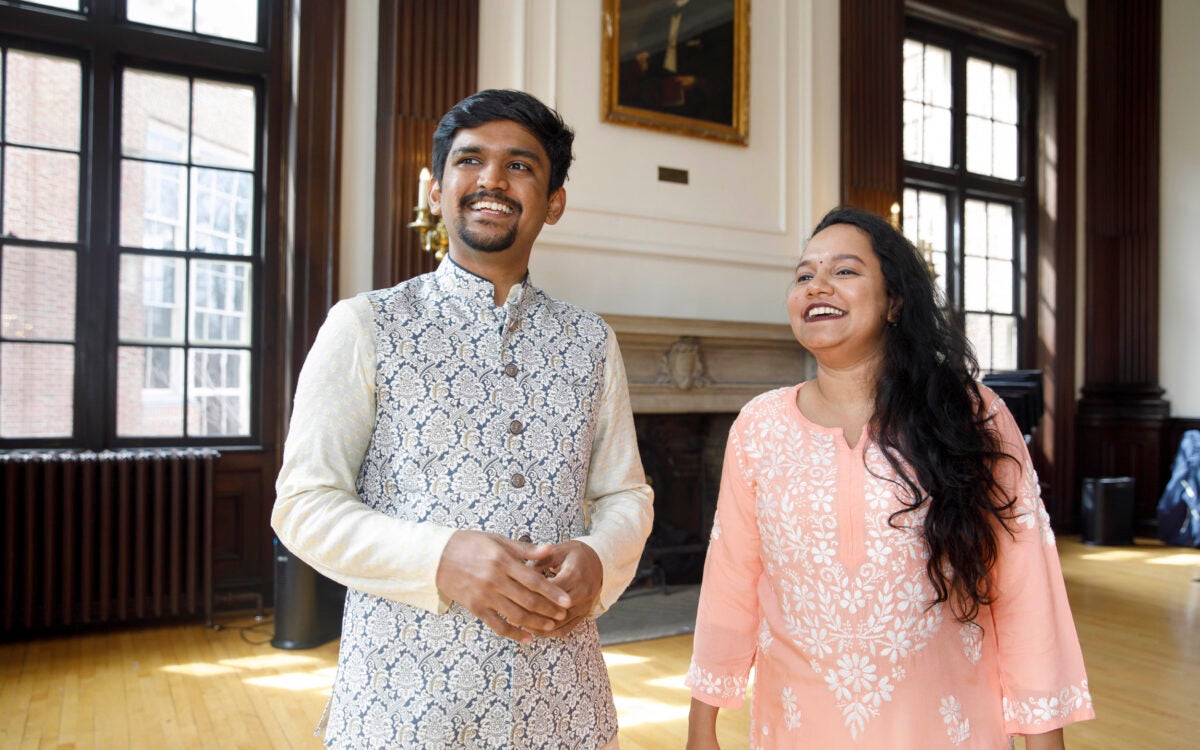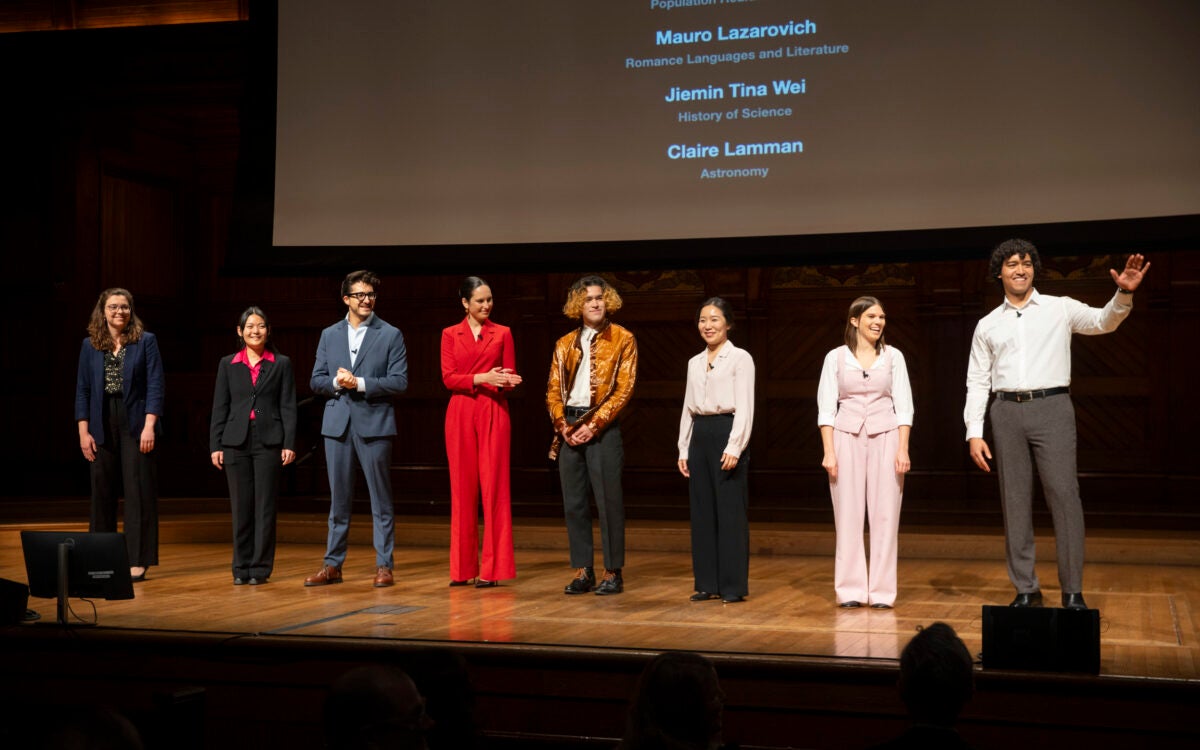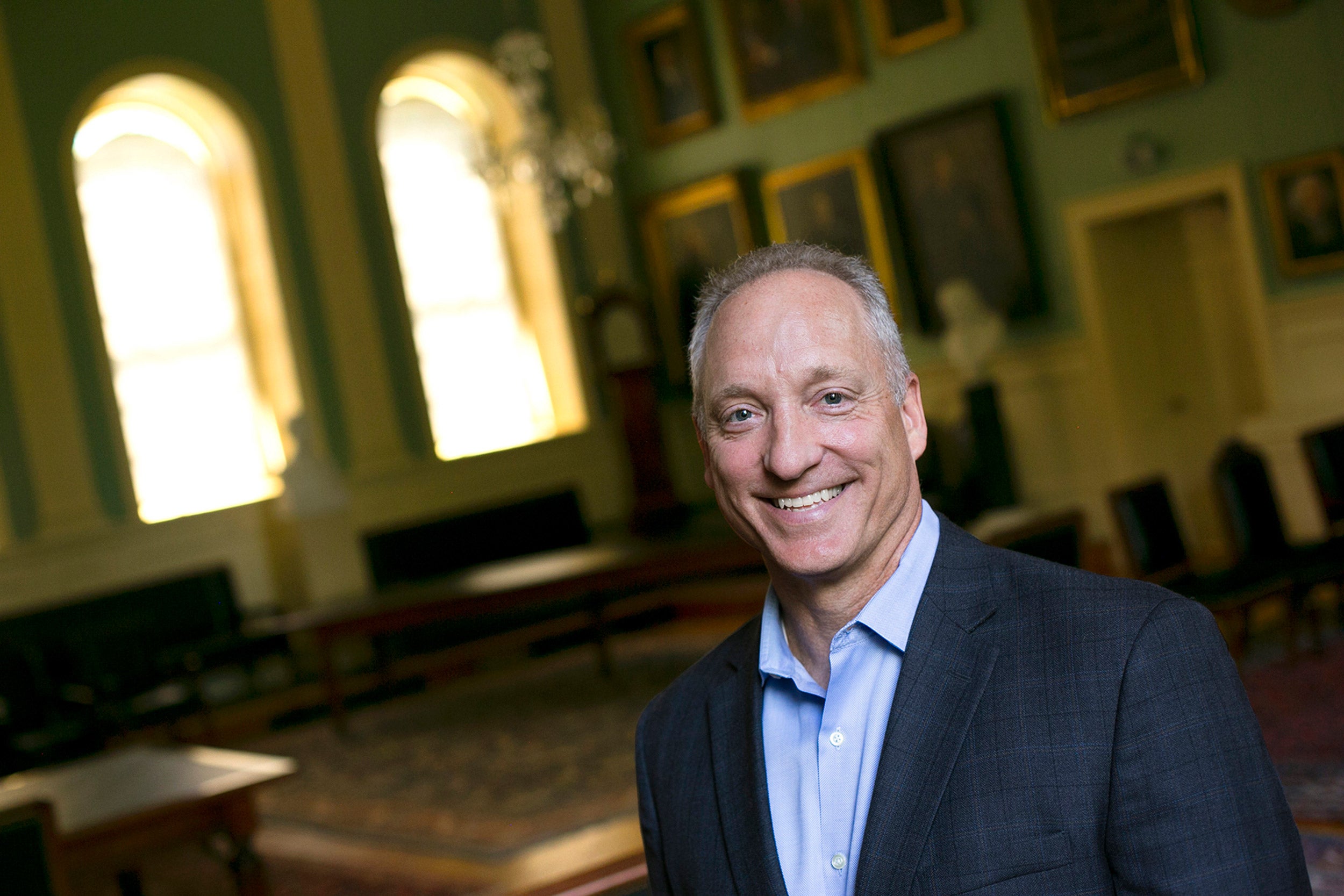
Michael D. Smith, who just stepped down as dean of Harvard’s Faculty of Arts and Sciences, reflects on his tenure and what may lie ahead.
Photo by Juliette Halsey
Mike Smith recalls his road traveled, and outlines path ahead
The child who wanted to be a used-car salesman grew up to be long-term dean of Harvard’s Faculty of Arts and Sciences
A childhood forged in the Northeast’s Kittatinny Mountains put Michael D. Smith on the path to becoming the Edgerley Family Dean of the Faculty of Arts and Sciences (FAS) at Harvard. Deep in Stokes State Forest in New Jersey, Smith discovered a sense of independence and self-reliance that served him well in 11 years of navigating Harvard’s largest School.
A member of the computer science faculty since 1992, Smith became dean of FAS at the invitation of President Drew Faust in 2007. He stepped down this month, succeeded by Claudine Gay. Smith, who is also the John H. Finley Jr. Professor of Engineering and Applied Sciences, will return to teaching. As he prepared to depart the deanship, he sat down for an interview with the Gazette to discuss his life and tenure.
Q&A
Michael D. Smith
GAZETTE: When you were a kid, what did you want to be when you grew up?
SMITH: A used-car salesman. I loved cars. I was a big Matchbox fan. Everything about cars was important to me. My parents had a good relationship with a car dealer where we lived, so I would go and hang out there and check out the cars. It looked like a cool job, you know, sitting around and playing with cars all day long. But it would have been a horrible professional choice for me. Selling people on stuff is not my idea of a good time. All the things that you really need to do well to succeed selling used cars, like being really talkative, I wasn’t very good at them. I was 7 or 8 when I figured out it wasn’t a good idea for me.
GAZETTE: What do you remember most about growing up?
SMITH: Both my parents were teachers, my father at Trenton State College, my mother in grade schools. We always had college kids in our house. And not just visiting, but living there. I’m pretty sure my parents made ends meet by renting out rooms in our house. We were always moving bedrooms around the house with whatever number of college kids there were living with us. I have memories of all of us being jammed into one side of the house on one floor, and then my brother and I eventually moved upstairs. It felt like being in a dorm before I ever went to college.
GAZETTE: How big was the house?
SMITH: We lived in a bunch of different houses, even built one of them. The first house we didn’t build. Then we bought the house next door, which was small, and my dad was constantly rebuilding it. Most of my life, I was living in houses that were never finished. Then we built one from scratch. A lot of weekends when my friends were out playing, I was building with my dad. He had me doing pretty much everything. It was a solar house. My dad was always ahead of his time. So maybe that’s what prepared me for renewing Harvard’s residential House system.
GAZETTE: Anything else to share about growing up?
SMITH: The other strong memory I have is of the programs my father used to run in the woods on weekends for inner-city kids. We’d go up to Stokes State Forest in northwest New Jersey. The kids were probably late high school, early college, but they looked extremely old and big to me. I was probably around 8 or 9. That’s where I learned to orienteer through the woods. Once my father knew I could get from point A to point B, and I wasn’t going to hurt myself too badly, I wandered all over the place. The college kids would all follow me through the woods because they could see “That little kid knows what he’s doing, let’s just follow him.” My wife and I have this joke that I get lost in Penn. Station because there are no trees. If I can see a tree, I’m fine.
GAZETTE: What do you think was the most important lesson of your childhood?
SMITH: It taught me a lot of independence, self-reliance. That you learn as you do. It doesn’t matter how big you are. I could do things those college kids couldn’t do. My parents never knew where I was. My mother would kick me out in the morning and say, “When I call you for dinner, you better be here.” Later, I’d hear her holler when it was time for dinner.
GAZETTE: What’s the worst trouble you got into as a kid?
SMITH: I wasn’t that bad. My brother, Andrew, was the troublemaker in the house. He was 19 months younger than me, but he was the first of us to swim competitively. We swam in a club in town and then at the YMCA. He was why I started swimming. When I first started, he was better than me, but then I began to catch up. We were very competitive. When I was at Stanford [getting my Ph.D.], he was at Syracuse.
GAZETTE: Your brother died from cancer at a young age. Did you see the world differently after that?
SMITH: I ended up going to a boarding school my senior year of high school, so I left home at 16 and didn’t see him much. I remember getting the phone call about his cancer. He came to live with us in California so he could get treatment out there, and he’d go back and forth to the East Coast. He died in 1991. I was 29. Now I ask myself why I didn’t spend more time with him. He was the better person. He made friends far easier than I did. He took more risks, had more fun. I named my son Andrew after him, but my kids never met him, and that’s such a loss for them and me. My son is a lot like my brother. There’s not a person my son couldn’t befriend and get to do something for him. Every time I turned around, he’d be wandering down the street, sitting on a bench talking to some complete stranger. He doesn’t follow the path, but he always finds a way to get where he wants to be. My daughter is very much like me, passionate about learning lots of different things. And now I have an 11-year-old stepson, and I’m really enjoying that. I have more time now to sit down and relax and enjoy the wonder of how kids can pick stuff up, and what interests him and what excites him.
GAZETTE: What’s important to you?
SMITH: Honesty. Straightforwardness with people. Empathy. I try to be understanding. I try to be forward-looking. Family is a big thing. And any job that I do, I want to leave it better than I found it. I also love working with students and with young people.
GAZETTE: How did you get to computer science and engineering?
SMITH: I went college thinking I was going to be a physicist. I liked science and math. Most kids who like science and math usually end up in something physical-sciences-related. But once I took my first college physics class, I realized I wasn’t a physicist. Then I took some engineering classes, and I realized I was a lot happier there. I could use math. I could use science. I could actually build things like a grown-up, and it just felt natural and easy. Today, I can go back and look at it and say, “And it has an impact on the world. As much as I like reading basic science, it’s important to me to be able to bring what I know, to learn something new, to make a difference, to solve a problem. It’s got to have a purpose.”
GAZETTE: You started a business. Why?
SMITH: There were two of us who really wanted to start it, two techies doing the usual thing, having some technology in search of a problem. We brought in a businessperson, but she was on the West Coast, so it really didn’t work. The whole thing crashed, of course, because funding completely dried up. When the dot-com bubble burst, nobody was funding anything. The other techie I started the company with left. I went out and found a real CEO, and it was just the two of us for a while. I self-funded the company for its first 15 to 16 months of existence. So it wasn’t very big because I couldn’t afford a lot. The funny part of it was that we were a technologist from Harvard and a CEO businessperson from MIT. Everybody told us we had it backward. I didn’t ever want to run it, so I was just hiring people to do so. And I was working there because I enjoyed what we were doing and I always told people that I had to hire good people because if the people weren’t fun to go and see, then I wouldn’t do it. We eventually sold the business.
GAZETTE: What did you learn in the private sector?
SMITH: I learned a lot about running organizations and how to make them operate better. That helped me when I became dean of the FAS.
GAZETTE: You became dean as the 2008 economic crash put severe financial pressures on the entire University. Financial challenges have continued to be difficult. Are these the toughest challenges you’ve faced?
SMITH: The financial stuff is all solvable. Sure, there were challenges in it — we had to fix all our budgets — but the bigger problem around money was the disconnect between our academic planning and the way we used our resources. I think we’ve fixed that.
GAZETTE: What do you consider your most important accomplishments as dean?
SMITH: I think we’ve done a lot with the tenure track, which is extremely important for us because we couldn’t compete the way we were doing it. The world’s vastly different. And if you look at the departments that have embraced these changes, they have fantastic people. We sent over so many cases this year for internal promotions where the person is clearly the leader in the area, doing wonderful work. And they love the teaching part of it as much as they love the research part of it. That had never been true before.
GAZETTE: It’s now many years after you were captain of the Princeton varsity swim team as an undergraduate, but you still swim. Why?
SMITH: I love the community. It’s a good group of people. And they don’t care who you are when you’re at the pool. They’ll give you the same amount of grief. They all know — well, not all of them, some of them are still not sure of the fact that I can get into any room and building down there. But they think I’m the one responsible for changing the soap dispensers and such. That’s the grief I get all the time. Why can’t I fix the parking problem? And so on. They still give me grief like they give anybody else.
GAZETTE: What are you going to miss about being dean of the FAS?
SMITH: You get to do amazing things. Where else could I go do a tail-hook landing on an aircraft carrier? Or travel to Chile and climb to the top of a mountain and look at the stars? Or visit an old missile silo and find in the bottom of the bunkers a whole vat of flesh-eating beetles because apparently those beetles are still the best way to get flesh off the skeletons our biologists want to study? I got to walk in a robotic exoskeleton suit and go up the towers at Harvard Forest. I went behind the scenes in China’s Forbidden City. You can do some of those things as an individual in a particular area, but you can’t do all of those things unless you’re in a chair like this. Every year I tried to do something different in some part of the FAS that I didn’t normally think about, just to experience it. I’m going to miss the alumni, too. I so much enjoyed getting to know so many and hopefully will continue to have contact with many of them. They’re just incredible people. They care so deeply about this place.
GAZETTE: What are you looking forward to the most after closing the door here?
SMITH: I’ve missed the teaching. So I’m looking forward to getting back into the classroom, and I’m looking forward to learning all this stuff I was able to see from a distance and say, “That’s really cool. I’d like to know more about that.” But then the next briefing memo came across my desk. So there are a lot of things I want to learn about. There’s a lot of interesting stuff happening in artificial intelligence. All my friends in computer architecture know about building architecture for all this AI processing. So I want to know a little bit more about that. But I’m more interested in connecting some of the stuff I knew and bringing a different view. There are so many more fields, like biology, that need computation. I’m not going to go back to doing the kind of research that I was doing before becoming dean. So I have more freedom. I’ve been away long enough that no one expects me to try to catch up. Those are the things I’m looking forward to when I close the door, I get to be an academic again. I probably won’t show up to too many faculty meetings.
This interview was edited for length and clarity.
